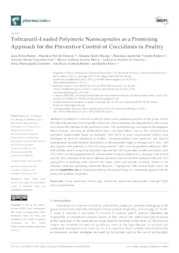Toltrazuril-loaded polymeric nanocapsules as a promising approach for the preventive control of coccidiosis in poultry.
Toltrazuril-loaded polymeric nanocapsules as a promising approach for the preventive control of coccidiosis in poultry.
Author(s): BARON, L. F.; FONSECA, F. M. da; MACIAG, S. S.; BELLAVER, F. A. V.; IBELLI, A. M. G.; MORES, M. A. Z.; ALMEIDA, G. F. de; GUTERRES, S. S.; BASTOS, A. P. A.; PAESE, K.
Summary: Abstract: Coccidiosis is a disease caused by intracellular protozoan parasites of the genus Eimeria that affect the intestinal tract of poultry. However, strain resistance and drug residue in the carcass have drawn the attention of the productive sector. The nanotechnology can improve the biological effect of drugs, reducing of administered doses and toxic effects. Due to this, toltrazuril-load polymeric nanoparticles based on Eudragit® S100 (NCt) or poly-?-caprolactone (LNCt) were developed to prevent coccidiosis in broilers. Nanoformulations were produced and showed homogeneous particle diameter distribution in the nanometer range (z-average and D (4.3) < 200 nm), negative zeta potential ( 90%. Cell viability assays using avian fibroblasts showed that LNCt presented no relevant toxicity up to 72 h. LNCt was then prophylactically administrated to chicken followed by challenge with Eimeria oocysts. The evaluation of the small intestine and cecum showed that the treatment with LNCt (3.5 mg/kg/day) in drinking water reduced the lesion scores and oocysts excretion, similar to the reference medicine containing toltrazuril (Baycox®, 7 mg/kg/day). The current study shows the potential protective use of nanoencapsulating anticoccidial drugs as a promising approach for the control of coccidiosis in poultry. Resumo: A coccidiose é uma doença causada por parasitas protozoários intracelulares do gênero Eimeria que acometem o trato intestinal de aves. No entanto, a resistência à cepa e o resíduo de drogas na carcaça têm chamado a atenção do setor produtivo. A nanotecnologia pode melhorar o efeito biológico dos fármacos, reduzindo as doses administradas e os efeitos tóxicos. Devido a isso, nanopartículas poliméricas com carga de toltrazuril à base de Eudragit ® S100 (NCt) ou poli-ε-caprolactona (LNCt) foram desenvolvidas para prevenir a coccidiose em frangos de corte. Nanoformulações foram produzidas e apresentaram distribuição homogênea do diâmetro das partículas na faixa nanométrica ( z-média e D (4,3) < 200 nm), potencial zeta negativo (<-8,93 mV), teor de droga ~ 100% e eficiência de encapsulamento > 90%. Ensaios de viabilidade celular utilizando fibroblastos de aves mostraram que LNCt não apresentou toxicidade relevante até 72 h. LNCt foi então administrado profilaticamente ao frango seguido de desafio com oocistos de Eimeria . A avaliação do intestino delgado e ceco mostrou que o tratamento com LNCt (3,5 mg/kg/dia) na água de beber reduziu os escores de lesão e a excreção de oocistos, semelhante ao medicamento de referência contendo toltrazuril (Baycox ® , 7 mg/kg/dia ). O presente estudo mostra o potencial uso protetor de drogas anticoccidianas nanoencapsuladas como uma abordagem promissora para o controle da coccidiose em aves.
Publication year: 2022
Types of publication: Journal article
Unit: Embrapa Swine & Poultry
Observation
Some of Embrapa's publications are published as ePub files. To read them, use or download one of the following free software options to your computer or mobile device. Android: Google Play Books; IOS: iBooks; Windows and Linux: Calibre.
Access other publications
Access the Agricultural Research Database (BDPA) to consult Embrapa's full library collection and records.
Visit Embrapa Bookstore to purchase books and other publications sold by Embrapa.

